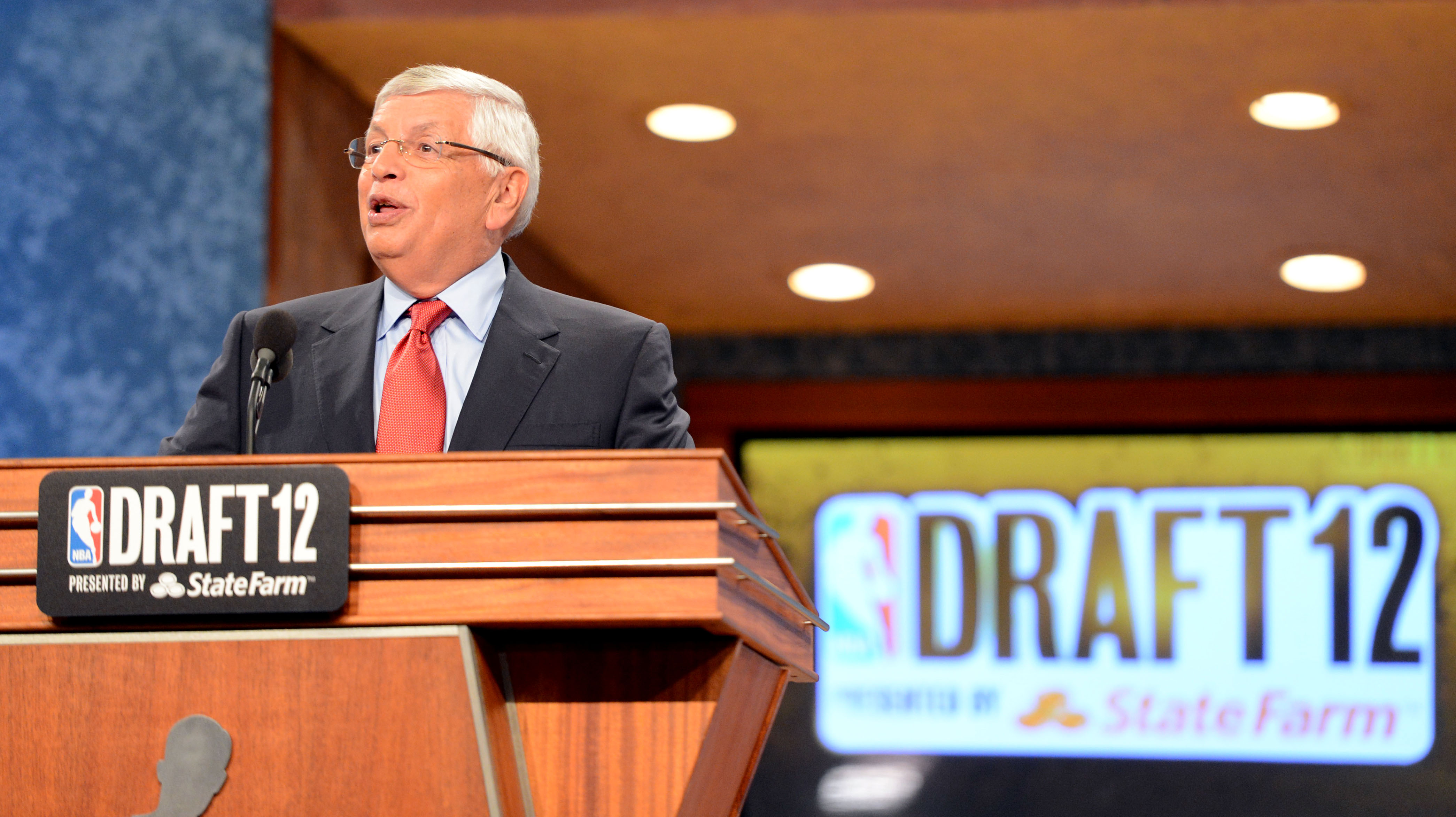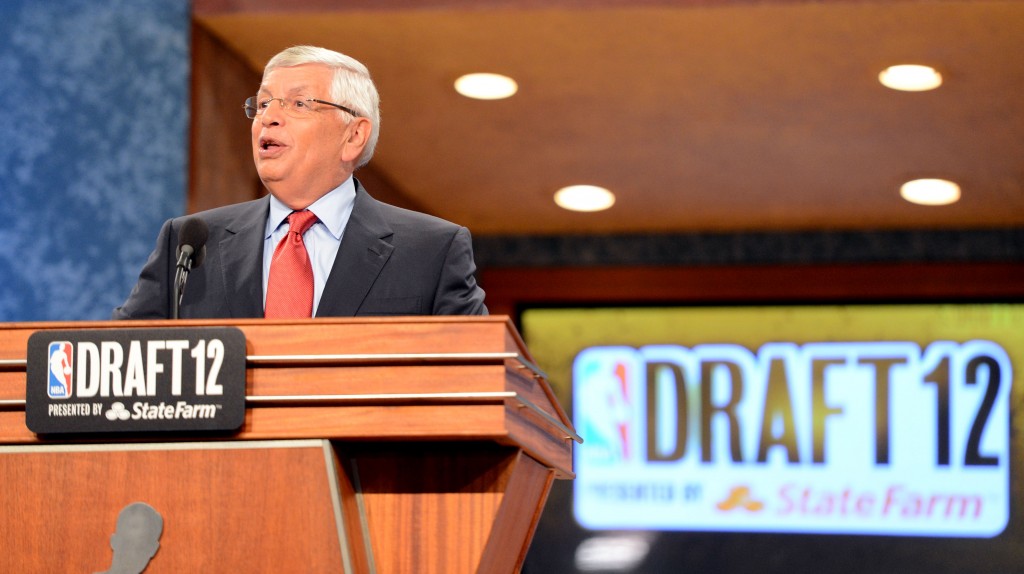The following article is a guest contribution by Benjamin Haynes, Esq. Haynes is a former Division 1 Basketball Player at Oral Roberts University and currently practices law in the State of Florida.
Last night, the long awaited 2012 NBA draft took place [click here for The 2012 NBA Draft Agents/Players List]. After the 2011 NBA Draft, which was unarguably one of the worst we have seen in years, the NBA needed a draft night which would bring forth franchise changers and future superstars. We were not disappointed. As a matter of fact, last evening’s draft was most likely the best array of talent we have seen in a draft since LeBron James led the way in the 2003 Draft class.
In this article I will compare the lottery players from the 2003 NBA Draft to this year’s 2012 NBA Draft, and try to determine whether or not this year’s draft is better, or whether this year’s draft is even in the same vicinity of the 2003 draft.
How will I do this? I will compare each pick against one another, for example, the number 1 pick of 2003, LeBron James, vs. the number 1 pick of this year’s draft, Anthony Davis, and on down the line. At the end I will make an assessment on the group as a whole and finally come to a conclusion on which year had the better draft.
2003 Picks vs. 2012 Picks
#1 LeBron James vs. #1 Anthony Davis
Reasoning: Anthony Davis is going to be an all NBA first team defensive player. He has a high basketball IQ and a willingness to share the ball. By the end of Anthony’s freshman season he was even starting to post up on the block and finish with some nice post moves. However, as great as Anthony Davis is LeBron James is a top 5 player of all time. LeBron came into the league fresh out of high school and was the most hyped player in the history of high school basketball. He has without a doubt lived up to the hype and the expectations. As an 18-year-old rookie, LeBron averaged 20 points, 5 rebounds, and 6 assists a night. While Davis will be a better defensive player right out of the gate, LeBron was a better all-around player. With 3 regular season MVP’s, a finals MVP, and a world championship all at the age of 27, you have to tip your hat to the “King” on this pick.
Winner: LeBron James (2003:1 2012:0)
#2 Darko Milicic vs. #2 Michael Kidd-Gilchrist
Reasoning: This is a freebie for the 2012 class. Sorry, Darko. In 2003, the Detroit Pistons decided it was best to take a center out of Serbia over the likes of Carmelo Anthony, Chris Bosh, or Dwyane Wade. Darko has averaged 6 points per game throughout his career, and goes down as one of the biggest “busts” in draft history. Kidd-Gilchrist is a 6’7 warrior who played his college ball at Kentucky, where he won a National Championship. With Anthony Davis going first, and Michael going second, this was the first time in NBA history that the number one and two picks were from the same college. Gilly the Kidd bullies Darko in this bout.
Winner: Michael Kidd-Gilchrist (2003:1 2012:1)
#3 Carmelo Anthony vs. #3 Bradley Beal
Reasoning: Carmelo won a championship as a freshman at Syracuse. He came in the league with high expectations, and he has been one of the best scorers in the NBA, year in and year out. Melo has averaged 24.6 points per game over the course of his NBA Career. Brad Beal has been compared to Dwyane Wade and Ray Allen. Beal will play alongside John Wall at Washington and will have a lot of open looks, and will be a fantastic all-around player for the Wizards. However, Beal is not the prolific scorer that Carmelo is, and Carmelo wins in this match-up.
Winner: Carmelo Anthony (2003:2 2012:1)
#4 Chris Bosh vs. #4 Dion Waiters
Reasoning: Chris Bosh declared for the NBA after his freshman year at Georgia Tech. He has averaged a total of 19.4 points per game over the entirety of his career, and just won his first NBA championship in Miami. Waiters was the 6th man of the year in the Big East as a Junior. Dion is a great scorer and could be the biggest surprise guy in the draft. Bosh, however, is an all-star player and I don’t see Dion Waiters ever reaching an all-star caliber. Chris Bosh is victorious in this comparison.
Winner: Chris Bosh (2003:3 2012:1)
#5 Dwyane Wade vs. #5 Thomas Robinson
Reasoning: Dwyane spent two seasons at Marquette under Tom Crean. While Wade was expected to be a great player in the NBA, he made the jump from greatness to superstardom helping the Heat win two World Championships since his time in south beach. Thomas Robinson has been through a lot in his young career, after un-expectantly losing his grandmother and his mother in the span of 25 days. Thomas is a skilled power forward who will be a great character guy for the Kings. Robinson will most likely never be an all-star player in the NBA, and Wade has already proven that he is.
Winner: Dwyane Wade (2003:4 2012:1)
#6 Chris Kaman vs. #6 Damian Lillard
Reasoning: Chris Kaman has been a solid Center in the league for nine years. Kaman is a one time NBA all-star and has averaged 11.9 points per game over his career. Lillard has impressed all of the NBA scouts during his workouts. He is a 6’3 point guard who is the best shooting point guard in the 2012 draft. Lillard has a very high ceiling and I believe that he will surprise people with just how good he is. I am giving the nod to Damian.
Winner: Damian Lillard (2003:4 2012:2)
#7 Kirk Hinrich vs. #7 Harrison Barnes
Reasoning: Hinrich was the top point guard chosen in the 2003 Draft, who played his college ball at Kansas alongside Nick Collison. Kirk has never been an all-star in the NBA, but he has always been a solid contributor on each team he has been on averaging 12.5 points per game throughout his career. Harrison has an NBA ready game right now. Barnes, who spent two seasons at North Carolina, is a great one-on-one player and a great shooter. I can see Harrison being one of the top scorers for his team. Kirk wins this battle strictly because he is a great defender, and Harrison is not, making Kirk a better all-around player.
Winner: Kirk Hinrich (2003:5 2012:2)
#8 T.J. Ford vs. #8 Terrence Ross
Reasoning: T.J. Ford was the fastest guard in the 2003 NBA draft, and some even stated he was the fastest guard in the NBA during his first few years. Ford had an injury plagued career, and was forced to retire after a spine injury this past season. Terrence Ross is a 6’7 guard who spent two years at the University of Washington. Ross is extremely athletic and explosive, and will be a great defender in the NBA. Ross will get the overall win in this match-up, not based on talent alone, but based on longevity.
Winner: Terrence Ross (2003:5 2012:3)
#9 Mike Sweetney vs. #9 Andre Drummond
Reasoning: Sweetney was a very large power forward coming out of Georgetown at 6’8 275lbs. Mike had a very short four year career in the NBA, where he only averaged 6.5 points per game in his tenure. Andre Drummond spent one year at UCONN, and has the biggest upside out of anyone in the draft, besides Anthony Davis. Andre is 6’10 and is a freak athlete. Drummond will have a successful career playing alongside Greg Monroe in Detroit. Andre is bigger and better than Mike.
Winner: Andre Drummond (2003:5 2012:4)
#10 Jarvis Hayes vs. #10 Austin Rivers
Reasoning: Jarvis Hayes spent three years in college, two at Georgia. Hayes had a decent NBA career averaging about 8 points per game over his eight year career. Hayes was a solid player, but Austin Rivers has superstar offensive ability. Rivers has an NBA ready game and he is the best one-on-one offensive players in the 2012 NBA draft. Austin will have a better NBA career than Jarvis.
Winner: Austin Rivers (2003:5 2012:5)
#11 Mickael Pietrus vs. #11 Meyers Leonard
Reasoning: Mickael came straight to the league from Les Abymes, Guadeloupe. While Pietrus has only averaged about 9 points per game in his NBA career, he has been a great spark off the bench for various teams. Meyers is a big 7’0 Center who still has a lot of room for improvement, but has the potential to be a solid big man in the NBA. I don’t believe Leonard will ever have a big impact in the NBA, and Mickael has had a role player impact.
Winner: Mickael Pietrus (2003:6 2012:5)
#12 Nick Collison vs. #12 Jeremy Lamb
Reasoning: Collison had a great college career playing at Kansas, and has been with the Seattle Supersonics/Oklahoma City Thunder organization his entire career. Nick is a gutsy power forward that has averaged 7 points and 6 rebounds a game. Jeremy Lamb is a 6’5 wing player who spent two years at UCONN before being selected by the Houston Rockets. Lamb is a great shooter and scorer who will be a better NBA player than he was in college. If we were talking strictly college, Nick would win, but we are talking NBA and Lamb has an NBA type game. Edge to Jeremy.
Winner: Jeremy Lamb (2003:6 2012:6)
#13 Marcus Banks vs. #13 Kendall Marshall
Reasoning: Banks was selected by Boston to play the point guard position in the 2003 NBA Draft. Marcus contributed sparingly his first few years in the NBA and has since fizzled out. Kendall is a true point guard who spent two years at North Carolina. Marshall will be coming off of the bench behind the great Steve Nash in Phoenix, but Marshall’s skills will translate to a long NBA career. Marshall wins this one.
Winner: Kendall Marshall (2003:6 2012:7)
#14 Luke Ridnour vs. #14 John Henson
Reasoning: Luke Ridnour has been a feisty player in his tenure in the NBA. A 6’1 point guard out of the University of Oregon who has been a solid NBA player. John Henson is a tall, lanky defender out of North Carolina. John has the ability to block shots and finish around the basket. Henson has a lot of ability, but Luke Ridnour has shown that he is a starting point guard from day one in the NBA. Luke’s skills have given him a long and productive career. I believe Henson will be an average NBA player who will find time sparingly off of the bench. Luke’s skills wins him this battle
Winner: Luke Ridnour (2003:7 2012:7)
Conclusion: Based on my above evaluation of the two year’s lottery picks, the scoreboard would say that this battle ends in a tie. If I were to continue this evaluation for picks 15-60, I believe that the 2012 NBA Draft would prevail when comparing each pick. However, when we are talking about franchise changers and sheer talent, the 2003 draft is still unmatched. LeBron, Carmelo, and Wade have made their mark in the NBA and are three of the top ten players in the league today. Therefore, because LeBron and the 2003 draft has made more of an impact on the league than 2012’s draft class has the potential of making, the 2003 NBA draft is still the greatest draft the NBA has seen.

